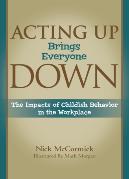Book Review: Acting Up Brings Everyone Down
This blog is reader-supported. When you purchase something through an affiliate link on this site, I may earn some coffee money. Thanks! Learn more.
Read our review guidelines.

The book looks at how behaviour in the workplace often mimics behaviour you’d more likely expect to see in a children’s playground, and basically tells us to grow up. Start taking responsibility for what you do at work and how you do it, and leave all the playground tactics behind. McCormick writes:
“Not surprisingly, much of the childish behavior exhibited by adults and explained in this book results from fear—fear of losing a job, fear of losing out on a promotion. We need to realize the best way to conquer the fear is to meet it head on. If there is fear about losing a job, start planning for the next one. Learn something new. Do some positive things rather than wallowing in the mud.”
It’s a very positive book, and, I think, better than his last one, Lead Well and Prosper: 15 Successful Strategies for Becoming a Good Manager. Wanda and Joe, the lead characters in Lead Well, are back, but this book is less story and more guide. This makes it easier to read, as the characters aren’t getting in the way of the advice.
And every chapter is packed with opinionated advice on being better at work:
“What a difference it would make if we actually did things for the good of the organization and fellow co-workers instead of just ourselves…if we stopped trying to build empires, stomping out those that “get in our way,” if we shared credit…if we shared anything!”
This is the kind of thing that you need your mentor to tell you, because no one else will own up to the fact this type of behaviour goes on. A lot of it is common sense, but sometimes we need a kick to assess whether we actually behave in this way. Does this strike a chord with you?
“The fact that employees are being asked to do more and more allows them plenty of items/tasks to substitute for those they don’t like to do. For instance, no matter how busy, the average worker always seems to have time for non-work related activity. A 2005 web survey by America Online and Salary.com found that American workers ‘fritter away’ 2.09 hours/day not including lunch. Surfing the Internet was cited as the number one time-wasting activity. At a time where people are ‘busier than ever,’ they have time to check the scores of the game last night or download some music from iTunes. Why? Because, checking the Internet is more fun and it’s given a higher priority; and why not ‘stick it to the boss since she now has me doing two jobs?’”
McCormick reflects back the office environment and challenges the reader to rise above that. Focus on what is important, he urges. Do what’s right for the company, regardless of what’s going on around you. The book is a call for an end to hidden agendas, but it’s also a request for you to up your game.
If you sign up for five things, you need to do all five of them well and on time. The efforts to please, show value, and the like are squandered when promises are broken. I’m not sure why so many promises are broken, but it probably has something to do with the fact that there is typically no penalty for not honoring commitments and there is no reward for honoring them. The bar has most certainly been lowered. Honoring commitments no longer seems to be an expectation of the job. It is now seen as being exceptional… My question back to these people is, “Are you confident enough in this idea of yours that you’d borrow from your 401K [U.S. pension-type scheme] to make it happen? Let’s pretend this is your money. Would you replace the ten thousand dollar printer to gain that extra productivity, or would you deal with the one you have for a bit longer?”
If we all took McCormick’s advice, offices would be a friendlier, less political, space. And businesses would be doing better.
